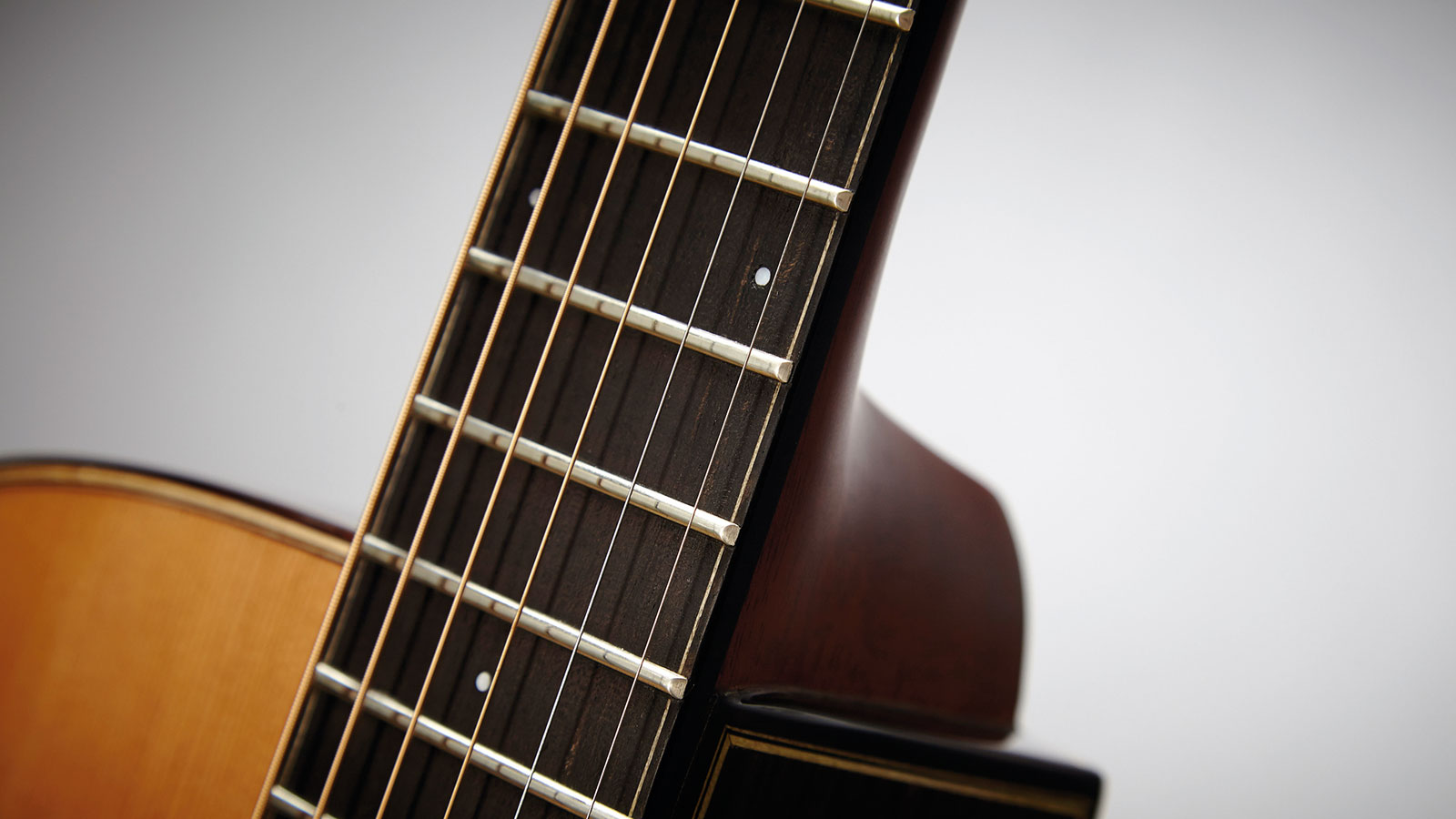MusicRadar Verdict
The mid-size body and serious spec make this a high-quality all-rounder. Pickers may want wider string spacing.
Pros
- +
Impressive build, quality control and setup. Great tones for folk and blues fingerstyle playing.
Cons
- -
Lydia pickup sounds a little un-natural.
MusicRadar's got your back

Auden Colton Chester Spruce Cutaway

Fretboard
There's been no shortage of new acoustic guitar brands in the last decade. Driven by improved standards in many Asian manufacturing facilities and easier trade therewith, it's entirely possible for pretty much anyone to tweak a few classic designs, slap their name on the peghead and wait for the container to arrive.
While it's a superb way to establish instant manufacturing capacity with just a fraction of the associated costs, the results vary wildly. At one end, you find tons of those woeful GSOs - guitar-shaped objects - inevitably destined for some uninterested teen's dusty corner; and at the other are high-quality instruments asking you to consider them seriously alongside the great names of the guitar-making world.
You'll have guessed by now that Auden is in the latter camp, also adding UK-based final assembly and QC to the process. Conceived by boss-man Doug Sparkes and luthier-business partner Rob Bowman, Auden's goal is simply to offer guitars that deliver a combination of spec, playability and tone, at a price unmatched by any other brand. So, no pressure then...
Build
We have a fairly traditional approach to all-solid wood soundbox construction. Clearly very high-quality timbers, exacting attention to detail and superb finishing tell you immediately that both care and craft are high on the Auden agenda. It shows: extremely tidy scalloped X-bracing, struts and lining; beautifully executed maple and rosewood binding front, back and sides.
"It's very much understated classic-meets-modern precision"
Against the deep chocolate brown of the solid Indian rosewood, it's very much understated classic-meets-modern precision. Interestingly, Auden does its final assembly - including final neck set, fret finishing, hardware/electronics fitment, buff and polish - here in the UK, along with setups and final QC.
The finish itself is a polyurethane gloss over polyester base, which is likely to remain good looking and protective over many years, albeit never take on the patina of nitrocellulose as time goes on. A nice touch is that in every guitar case is an invitation to visit Auden's Northamptonshire facility, to meet the team and get your guitar set up as you like it.
The solid mahogany neck has a scarfed headstock joint and glued-on heel with a modern, slimmish, rounded profile that will offend nobody. Finished in satin polyurethane, it feels fast to play, the modern vibe continued with a gentle taper in thickness as you go up the neck.
What you can't see is that the neck uses a proper carved and tapered, hide-glue dovetail joint. Whether that is 'better' for tone is a moot point (traditionalists tend to believe it is), but it is problematic to do in any great numbers; mortise-and-tenon neck joints are more common where production volume is high. That's as far as we'll go with that chestnut.
Another quality touch is that Auden supplies a custom-shaped bone saddle in addition to the composite saddle that comes factory fitted.
The recommendation is you use the composite saddle if you play plugged in a lot (it has more even vibration transference to an under-sadddle pickup), but the bone saddle if your playing is predominantly acoustic (it sounds 'better' acoustically): it's great to have the option.
The pickup in question is a Schertler Lydia system; an undersaddle transducer, tiny preamp section with two 3V lithium batteries and a mini volume control tucked neatly in the soundhole.
Sounds
The Chester's dimensions belie its '000' description; it's a quarter-inch deeper than Martin's classic and a little wider, too, which is borne out in the tone. The full-scale length and more space in the soundbox returns more deep bass and more strident string separation than you might expect from a 000: you might say this would be a better all-rounder, in fact.
"The midrange is at the fore, which enables folky or bluesy fingerstyle to project better"
The midrange is at the fore, which enables folky or bluesy fingerstyle to project better, sweetened by a softer treble range than the dread.
Plugged in, we had a Fishman F1 Analog (in a Martin DCPA4), a K&K Pure Mini under-bridge transducer (Collings CJ35) and Taylor's pre-2014 ES (714ce) on hand for comparison.
The Chester's Schertler is consistently the most crystalline and 'under-saddle'-sounding system of the four through our reference AER Compact 60 III. It's not a plugged-in sound we'd describe as 'natural' or 'warm', though it will cut well in a live band environment, to pull out an upside.
Auden will be more than aware that tempting guitarists away from established brands - with their decades of experience, name-artist association, retail presence and large marketing budgets - is a Herculean task.
Judged on the merits of the instruments, however, these three guitars deliver a spec/ sound/price ratio that's unique in the market, thanks in part to the smart way the production is handled, and the focus on simple, high-quality design.
The Chester will no doubt best suit those who do as much Americana-influenced finger- and flatpicking as strumming - it's a great all-rounder.
The Curse of Coachella: Bad sound, bad gigs and even worse audiences… Is Coachella now the worst festival in the world?
They’re [heavily rumoured to be] back… Could Daft Punk be reforming for a residency inside Fortnite?
“Chinese Democracy was a boring record. But calling it Guns N' Roses was not honest. It was totally a solo record”: GN’R’s ex manager takes aim at Axl Rose









